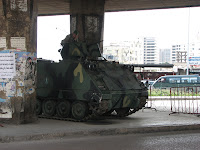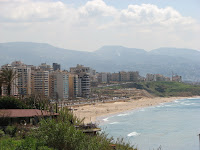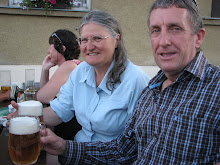There were no signs in English script at the bus station and we met up with 4 French girls and one was able to speak Arabic so she helped us find the right bus and let us know what time it was leaving.
The bus was completely full and we had no problems getting through the Syrian border exit. At the Lebanese border we had to fill in documents and change money with the money changers outside on the street as we had to pay for our 15 day tourist visa inLebanese pounds. Had we known we could have used an ATM at the arrivals office and not had to exchange our Syrian currency for such a poor rate. Our guide book has a lot of useful information and already it is out of date about the ATM that are available now. Later we used a machine and found that it also dispensed American dollars too.

There is no bus station in Beirut. The bus stopped under a motorway bridge and dropped us at the roundabout there. There was an army tank with soldiers in it stationed under the bridge and several others pacing up and down the intersection with their rifles. Of course we were tooted at by every taxi that came around. Luckily the French girls found a local who told us to wait for a bus and it would be a fraction of the cost of a taxi and drop us a short walk from our hotel.

The hotel turned out to be not far from the beach and the main shopping street in Beirut. There is a brand new corniche all along the waterfront and as soon as the sun came out it was full of people watching people. The waves were very high and crashed onto the rocks and up onto the footpath in places. The newly planted palm trees had their branches tied together as the wind had shredded many of them.

One day there was a marathon on the street beside the beach and we watched as hundreds of kids got into groups ready to race. The Muslim girls looked very hot in their scarves, long sleeved tops and long pants. We saw one end her race and pass out from the heat and had to be put in an ambulance. It was the hottest day that we have had for a long time too.
The Civil Wars and wars with Israel ended in 2000 and there are still a lot of buildings full of bullet holes and deserted but there are lots of new modern glass sky scrappers going up everywhere. In the shopping street there were the usual Starbucks, Mc Donald's and clothing chains that you would see in any other large city around the world. We were able to stock up on some supplies from a huge French supermarket in the city.
There is a large American University in the city and we saw lots of American students in the internet cafes and heard them on the streets. At night the streets near the university are crowded with cars 3 deep as the passengers buy coffee and snacks from the fast food shops that are crammed along the streets in front of the university. There are guys running up and down the street with trays of coffee to go and snacks for the lazy drivers who do not want to get out of their cars. There are lots of expensive cars in this city and many are huge 4 wheel drive ones.
They love their cars here. You take your life in your hands crossing the streets. They like to use their horns to tell you to hurry up, move over or ask if you want a taxi or minivan. Some of the horns sound like ambulances or police sirens. The women drivers are as wild as the male ones. Police direct the traffic at the traffic lights. I am not sure why that is, but it may be because the drivers don't take any notice of the traffic lights, signs etc. When they can the drivers like to make their wheels squeal and the noise goes on all night.The weekend here is Saturday and Sunday, but it feels like any other day of the week and is hectic all the time.
Before the war with Israel the population was 50% Muslim and 50% Christian. Due to the Christian exodus and the higher Muslim birthrate the population is now 70% Muslim, made up of Shiites, Druzes, and Sunni. Palestinian refugees make up 9%.

From our hotel window we looked onto an empty piece of land that had been cleared of its buildings and left to grow grass and collect rubbish. Three young lads turned up one day and shucked sweetcorn, boiled fava beans in a huge saucepan on an open fire in the yard and titivated up their trolley and headed off to sell to the strollers on the corniche.
